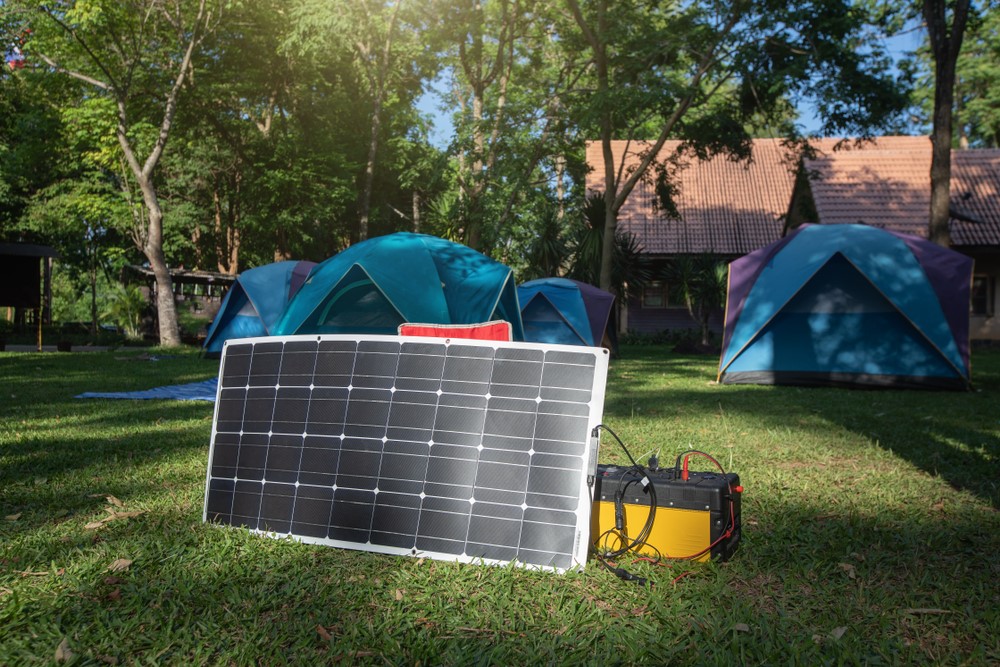- Updated On: May 27, 2025
Ground Mounted Solar Panels: The Smart Choice for Challenging Roofs
Are you considering a home solar system but your rooftop is not good for solar? Don’t worry! Ground mounted solar panels are the alternative solution for you. Not every roof is suitable for solar installation. Rooftop solar is not a good option if your roof is too sloppy, only has north-side space, or is not made of good quality material. A ground mount solar system can be a best fit substitute if your yard is large and exposed to the sun.

In this article, we will explain how ground mounted PV is different from rooftop systems and why it is a good option for a homeowner in certain circumstances.
What is a ground mounted solar panel system?
As the name suggests, a ground-mounted solar power system consists of solar panels installed on your home’s ground, yard, or garage rather than on your roof. Backyard solar panels, free-standing solar panels, and ground-mount PV systems are other names for ground-mounted solar panels.
The height of the panels can be a few inches to several feet above ground, depending on the mounting system used. This setup provides flexibility for adequate sun exposure, allowing you to keep some temperature-sensitive devices like solar batteries and string inverters in your garage.
Rooftop systems are usually limited to 60-cell panels, which are smaller and lighter, while you can have solar panels of any size, including “commercial” modules with 72 cells (or 144 half-cells) or more incase of ground mount solar systems. Also, you can install ground-mount solar systems in an open area with adequate sun exposure; however, they typically need at least 350 square feet space for installation.
What are the different types of ground mounted solar installations?
There are two basic types including:
Standard Ground Mount Solar
The most popular and affordable option for a ground install is the standard ground-mount system. Standard or traditional ground mounts use several types of small anchors to support a racking table for the solar panels. The type of anchor you use will depend on your ground conditions and can include concrete piers (the most common type), driven piers, helical piles, and concrete ballasts. Although these systems usually keep the solar array in a fixed position, due to solar technological advancement, there are manual adjustment options for homeowners to optimize orientation seasonally for maximum energy production.
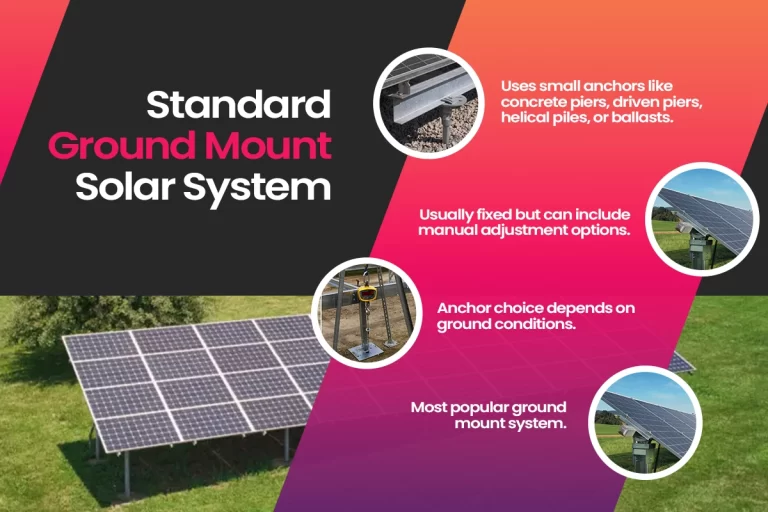
Pole Mount Solar System
Digging a single, deep hole in the ground is necessary for installing a pole-mount solar system. It will support a large pole of rails and solar panels. Pole-mount systems provide more ground clearance, which helps avoid barriers like foliage or snow. Another benefit of pole mounting is that it allows users to add a single- or dual-axis tracking system that tracks the sun’s movement during the day to generate more electricity. Since the system is more expensive per watt than standard ground mount systems, making them a better choice for those looking for high efficiency over cost savings.
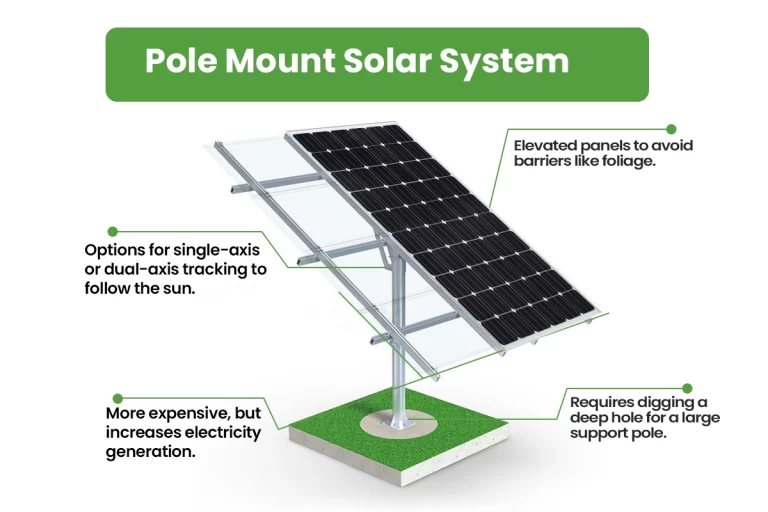
What are the pros and cons of ground-mounted solar panels?
If you’re considering installing solar panels on ground, here are a few things to think about:
Pros
- You can position these systems to receive the maximum sunlight while avoiding shadows cast by nearby obstructions and can boost solar energy output.
- You may enhance energy capture by adjusting the solar panel orientation seasonally or even daily to follow the sun with adjustable brackets.
- Access at ground level makes cleaning, inspection, and maintenance easier, guaranteeing peak performance and possibly cutting expenses over time.
- If your energy demand increases, you can easily expand your ground-mounted system. Upgrading a rooftop system is typically more complicated than adding panels to an existing ground array.
- Any solar system’s wiring has the risk of catching fire, but a ground-mounted installation keeps such hazards away from your house. These systems further reduce potential risks by using independent electrical grounding.
- You can use your ground-mounted solar array for dual purposes. It can shade patios and cars by acting as a canopy or carport. Additionally, you can also make it a spot for charging your EV.
Cons
- Ground-mounted solar systems require huge space which is one of their main drawbacks. This makes them unsuitable for urban environments or houses with limited acreage.
- Installing solar on the ground on your land may require special permits due to local zoning rules. Depending on the area, approval times may vary, from a few days to many months.
- Unlike roof installations that connect straight to existing rafters, they require a newly constructed structure. Compared to solar systems mounted on roofs, this results in greater upfront expenses.
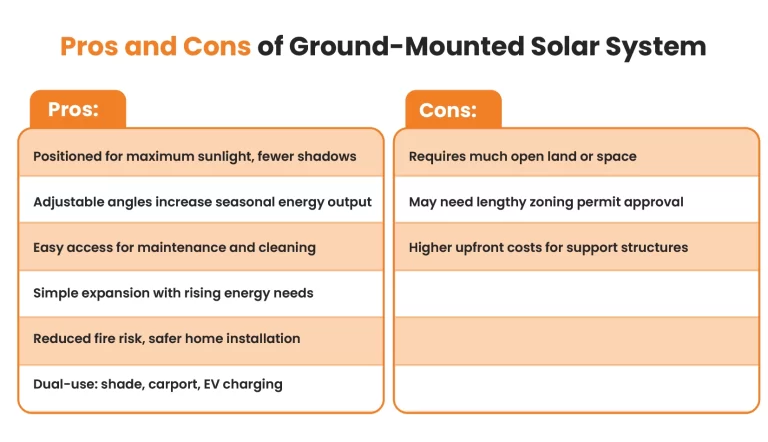
Ground-Mounted Solar VS. Rooftop Solar Panels
Ground-mounted solar panel systems are a good option, but rooftop solar panels are usually more popular. The type of system you choose will depend on your land and roof, and your financial condition. Rooftop solar panels are typically the best option if your roof is solar-capable and has enough space for solar panels according to your energy needs. Use ground-mounted panels if you have adequate open space and require a very large system that won’t fit on your roof.
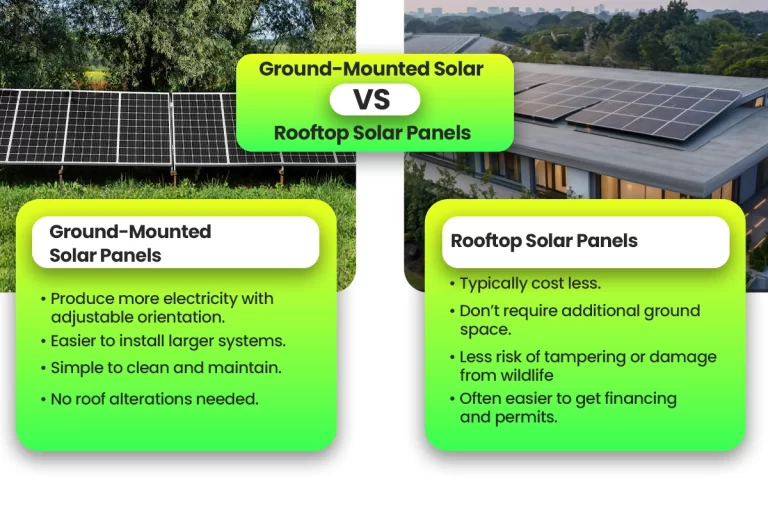
Are ground-mounted solar panels right for your home?
Ground-mounted panels may be a better option for you if your home utilizes a lot of energy, especially if you have a lot of open space on your property, which will allow you to install more solar panels. By installing a larger system, you will be able to generate more power to meet all of your energy needs. For some solar system designs, such as off-grid installations, ground mounts are a good option. However, installing solar panels on the ground may leave little to no space in your backyard. Rooftop panels might be a better choice if you want to utilize your yard space for your personal use.
In conclusion, choosing a ground-mounted solar panel system depends on your requirements. If your energy demand is high and your roof type is not good for solar, it is the best option for you. Moreover, you can talk to a trusted solar installer near you like Solar SME to help you make a decision whether mounted solar panels are best for you.
Want an instant estimate of your solar savings? Get a FREE Quote with our smart solar calculator now!
Related Articles:
The demand for sustainable and renewable energy sources is growing as more people are becoming more conscious of the green environment.
As the world strives to reduce carbon emissions, a rise in demand for renewable energy sources can be seen.
Wall mount solar panels are efficient and they are ideal for both residential and public buildings keen on reducing their carbon footprint. Solar panels mounted on walls are emerging as one of the revolutionary and realistic options options in the realm of clean energy. . Solar panels can now be installed straight onto vertical walls. Explore how wall mount solar panels work, their key advantages, and why they represent the next step in the evolution of renewable energy systems

